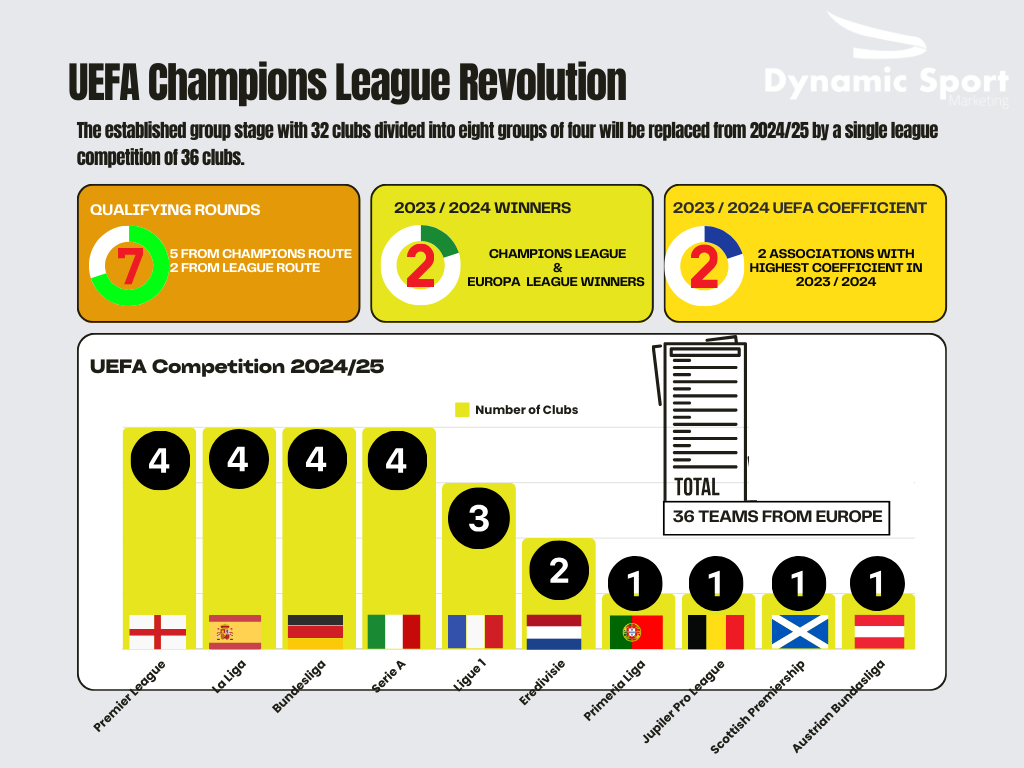
UEFA Champions League: More Teams, More Money, More Questions?
The 2024/25 kicks off with a major format change! More teams join, and the entire competition structure gets revamped. Looks like things are heating up, football fans more games, more money and possibly a better revenue distribution system. Find out more about the Champions League revolution.
The UEFA Champions League 2024/25 is upon us, and it brings with it a significant shakeup that’s sure to impact the landscape of European football. with UEFA Champions League format change, not only are we seeing an expansion in the number of participating teams. but also a complete overhaul of the competition format and revenue distribution system. Buckle up, football fans, because things are about to get interesting!

UEFA Champions League 2024/25 format change , Influx of More Teams: From 32 to 36 Teams
Gone are the days of the familiar 32-team Champions League. The upcoming season welcomes four new contenders, each with a unique story to tell. Here’s how those coveted spots are being allocated:
UEFA Champions League format change:
- A Boon for “Smaller” Leagues: The fifth-ranked national association according to UEFA’s coefficient ranking gets an extra slot in the group stage. Currently, that honour belongs to France, meaning they’ll have three guaranteed spots compared to the previous two. This opens doors for clubs from leagues that might not typically dominate European competition.
- Champions Path Widens: Domestic champions from “smaller” leagues also get a boost with one additional qualifying spot through the Champions Path. This increases their chances of reaching the prestigious group stage.
- Performance Pays Off: The two national associations with the best overall club performance in the previous season get an additional Champions League spot. Essentially, the team ranked next best in their domestic league (besides those already qualified) will have a shot at the big leagues. Italy currently holds the top spot for the 2023/24 season, with England and Germany vying for second place.
- Safety Net or Unfair Advantage?: The most debated addition is the allocation of the final two slots based on a national association’s overall performance. This essentially creates a safety net for established clubs from major leagues like the Premier League. Imagine a scenario where Tottenham Hotspur needs their rivals, Arsenal, to perform well in the Champions League to secure their own spot. This “big club bias” is a point of contention for many fans.

A League of Its Own: Goodbye Groups, Hello “Swiss System”
The familiar group stage format gets a complete makeover. Say goodbye to the eight groups of four teams and hello to a single league format with all 36 clubs competing against each other! Here’s how it works:
More Games, More Money
- More Games, More Revenue: Each team will play eight different opponents throughout the season, four at home and four away. This translates to two additional matches compared to the previous format, which is likely to please club accountants but might raise concerns about player fatigue.
- Seeding and the Draw: Teams will be ranked in four seeding pots based on their coefficient. This ensures a balanced matchup where clubs play two opponents from each pot – one at home and one away. Pot 1 will feature the reigning champions and the top eight ranked clubs by coefficient.

The Long Game: Impact on Football’s Future
The revamped Champions League format has the potential to significantly impact the world of football. Here are some of the potential consequences we might see:
- Increased Excitement and Unpredictability: With more teams and a wider variety of matchups, the competition could become more unpredictable and exciting for fans.
- Boosting Revenue for All Involved: The additional games and potentially larger audience could translate to increased revenue for clubs, broadcasters, and UEFA itself. This revenue, in theory, could trickle down to improve fan experiences.
- Player Fatigue and Fixture Congestion: Doubts exist regarding the impact on player fitness. The additional games could lead to increased injuries and fatigue, impacting overall performance. Balancing domestic and European competition schedules will be crucial.

The Final Whistle: A Discussion Starter
The 2024/25 Champions League promises to be a season unlike any other. While the changes offer exciting possibilities, they also raise valid concerns. Will this format create a more dynamic and competitive environment? Or will it simply widen the gap between the “elite” clubs and the rest? The beautiful game is about to evolve, and only time will tell how these changes will unfold.
Let’s continue the conversation! Share your thoughts and predictions for the upcoming Champions League season on our social media pages… Links below.
This was a report by Dynamic Sport marketing. Connecting your goals in the changing landscape of sport.
Contact us for support on freelance or a flexible basis if you want to reach sports fans for your brand:
Email us @ Dynamic Sport Marketing Or call us: +31(0) 38 8520831
For a full list of our services click this link for an overview of our easy consulting services